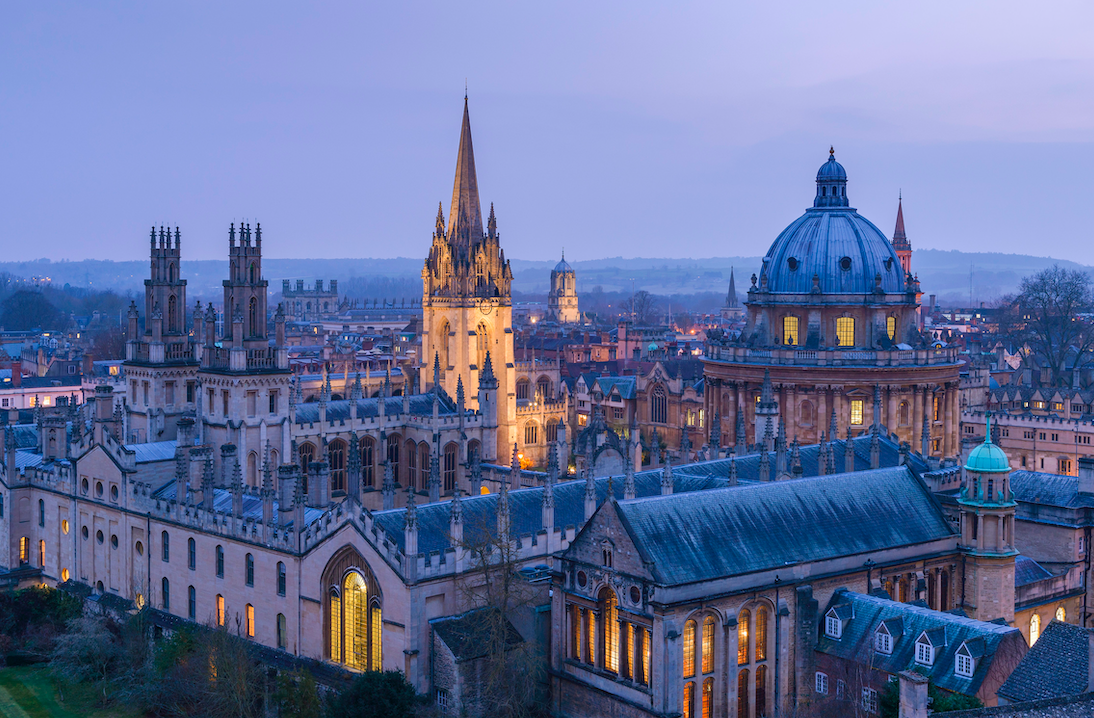From Manchester, the capital of England’s north and the birthplace of the industrial revolution, to the 2,000-year-old capital of London, England’s storied cities are showing how the country’s innovation does not stand still—which is why it’s home to more EMEA headquarter operations than anywhere else in Europe and some of the most distinguished academic institutions on the globe. And now its stand-out sectors are making England a world-class meeting place, too.
Throughout the centuries, England has fostered pioneers across multiple industries, from naturalist Charles Darwin, who developed a theory of biological evolution, to theoretical physicist Stephen Hawking and Virgin Group founder, Sir Richard Branson. England also harbours the largest industries in Europe for life sciences, automotive, aerospace, and ICT. Investment across England continues boosting the life sciences sector and technology like quantum computing, precision medicine, robotics and fusion as the country continues to make its mark on the world’s the future.
Legendary Life Sciences
In the north of England, 2,000-year-old NewcastleGateshead (composed of Newcastle on the north bank of the River Tyne and Gateshead on the south bank) come together to form a single conference destination that’s internationally recognized for its work in life sciences, healthcare and sustainability. Located right in the heart of the town (or ‘Toon’ as locals know it) you’ll find Newcastle Helix, a 24-acre, mixed-use site that serves as a landmark location for science, business, leisure and living.
NewcastleGateshead is the proud home of cutting-edge facilities, which include the International Centre for Life and Newcastle University Institute for Ageing (NUIA)—the largest of its type on the continent. Newcastle University was also awarded 17 million euros by the government to establish the National Centre for Ageing Innovation, bringing together world-leading scientists, the industry, the National Health Service (NHS), and members of the public to test and develop products that will aid in healthy aging. In addition, the pharmaceutical cluster is worth a sizeable 537 million euros to the region’s economy, and Newcastle upon Tyne Hospitals NHS Trust has ranked top for the fourth consecutive year for the UK’s largest number of clinical trials, working with nearly 12,500 patients.
In the northwest, Liverpool, a 2-hour train ride from London, is home to the most specialist hospitals and health centres in England outside of the capital city, including the Centre of Excellence in Infectious Disease Research (CEIDR). The acclaimed Liverpool School of Tropical Medicine, founded in 1898, was the first institution of its kind devoted to the research and teaching of tropical medicine, and the city now boasts more than 8,000 life science students (as well as the largest concentration of bio-manufacturing in Europe).
Thanks to its strength in the medical sector, Liverpool was chosen as the destination for the 47th Union World Conference on Lung Health World Congress in 2016, which gathered over 3,000 attendees from 126 countries. In an online survey following the event, nearly 100 percent of participants said they benefited from the conference, and 90 percent said they learned new insights on multi-drug resistant tuberculosis—part of the conference’s goal to improve lung health and reduce lung disease.
Financial & Professional Powerhouse
England’s financial and professional services sector employs over 2 million people—many of which are huddled around City of London’s square mile of offices, Leeds’ Financial Quarter and Bristol’s banking centre.
According to Global Financial Centres Index, London is considered one of the highest-ranking global centre for financial services on the globe, where major institutions like Barclays, the London Stock Exchange and The Bank of England are headquartered. There are an estimated 40,000 London-based companies that operate in the sector, which employs over 300,000 people. In 2019, the city hosted Sibos, the annual financial industry event, for the first time—and it was the largest yet, bringing 11,500 delegates and over 300 exhibitors to ExCeL London, a 100-acre site (the largest purpose-built event space in the city) on the northern quay of the Royal Victoria Dock in London Docklands. With a theme “Thriving in a hyper-connected world,” Sibos analised some of the challenges of mass digitization and data-driven groups its community is facing, with discussion led by speakers like London Stock Exchange CEO David Schwimmer and Deutsche Bank CEO Christian Sewing.

In the Midlands, meanwhile, the historic manufacturing hub of Birmingham has repositioned itself as a major banking and finance centre, with 321,000 employees working at more than 43,000 Business, Professional and Finance Services (BPFS) companies. The West Midlands is one of Europe’s largest and fastest-growing BPFS clusters, a reputation that started with the first Lloyds Bank in 1864 and continues this year with HSBC, who brought its banking headquarters to the region (which Deutsche bank and PwC also call home). One of the UK’s most accessible cities, with 90% of the UK population within 4 hours drive time of the city, Birmingham is seeing significant investment in its infrastructure, with major transport, property, hotel and public space projects underway.
Leeds, in the North of England, also boasts some of the best financial services sector in the country. The former wool hub is the birthplace of England’s first telephone bank, First Direct, and now there are a number of companies paving the way in Fintech, such as Panintelliengence, Contis, WorldPay and Nostrum Group, earning Leeds the nickname “Fintech Capital of the North.” With 20 of the fastest-growing tech companies in the North of England, it’s no surprise Leeds plays host to one of the largest digital events in the country, the annual Leeds Digital Festival. In 2018, 20,000 people attended the festival, which hosted 170 tech events over 60 venues during two weeks.
In 2017, Bristol, the largest city in southwest England, was voted best to live in in the UK by The Sunday Times. The city has amassed the largest aerospace and defence cluster in the country, in addition to being home to more than 20,000 people in the creative and media sectors (it’s the base of Aardman Animations, Bottleyard Studios and the BBC Natural History Unit). As for sustainability, Bristol was named the first European Green Capital in the UK in 2015 and is working toward a sustainable and low-carbon economy. The city brings this sense of sustainability to banking, paying particular attention to environmental, cultural and social impacts on businesses. This is what makes Bristol an ideal location for an institution like Triodos Bank, one of the world’s most sustainable, whose goal is to help individuals and businesses put their money toward initiatives that will benefit both people and the environment.

Brilliant Minds, Brilliant Meetings
In terms of world-class universities, it’s hard to beat two of England’s top: Oxford and Cambridge. Oxfordshire acts as a base for everything from the European space Agency to Formula 1 teams (60 percent are based in or on the county’s borders), and for some time, the city of Oxford has been an encouraging environment that has shaped national leaders, scientists, writers and philosophers. In fact, Oxford has more published writers per square mile than anywhere else on the globe.
Oxford’s first colleges were built in the 13th century and has since produced 27 British prime ministers, as well as 38 percent of Nobel Laureates. The university is the city’s largest employer, and, for the seventh year running, it’s been ranked first in the world for clinical, pre-clinical and health subjects by the Times Higher Education World University Rankings 2018. If you’ve ever wondered where the term Oxford Comma came from, it was right here at the Oxford University Press.
The University of Cambridge, meanwhile, is one of the oldest in the world and counts colourful alumni like Professor Stephen Hawking, Alan Turing, Emma Thompson, Sacha Baron Cohen and Charles Dickens. Around 107 Nobel Prize-winners are connected to the university—and 15 of those are from the last decade. In addition to the university, Cambridge offers particular expertise in infectious diseases, neuroscience, stem cells and cancer. The Cambridge Biomedical Campus is home to 7,000 healthcare professionals and scientists, while “Silicon Fen”—a collaboration academics and entrepreneurs—draws over 1,000 high-tech and IT companies that focus on software and electronics, and who have helped reshape the region as a centre of innovation and fostering the fastest-growing urban economy in the country.
This article was written by Boardroom editor Lane Nieset. The right to use it, in parts or in full, has to be granted by the Publisher. For more information about England as a conference destination, contact Caroline Phelan, Meetings and Incentive Senior Manager Europe, MeetEngland.
Last year, the city hosted the International Symposium on Equine Reproduction, which returned to Cambridge for the first time in 44 years. According to honorary secretary Louise Holder: “Cambridge as a destination is definitely a major draw in attracting delegates. Everyone wanted to visit the city where DNA was discovered and to experience the excitement of the Cambridge, as those delegates did 44 years ago.”
Brexit isn’t a deterrent when it comes to the potential England has in its key sectors—as well as in the meetings realm. The country that invented the steam engine, the discovery of DNA, the World Wide Web and graphene is continuing to thrive with modern development, world-changing discoveries and state-of-the-art facilities fit for royalty—as well as world leaders. If the successful London 2012 Olympic and Paralympic Games is any indication, England is stepping on stage as one of Europe’s most dynamic meeting places, with each of its powerhouse cities offering associations a wealth of innovation and knowledge.
